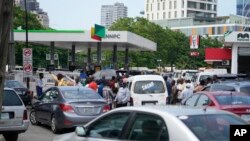As people rushed to buy gas in major cities like Abuja and Lagos, marketers have more than doubled the price at the pump from the usual 40 cents per liter, resulting in a surge in the price of transport.
Tinubu announced the removal of the subsidy moments after his inauguration as president on Monday, signaling his administration's plan to finally end an initiative that officials said cost the Nigerian government an estimated 18.39 billion naira ($39.8 million) daily in 2022.
He did not say when it would take effect, but the immediate past government had planned to end the initiative by June 30.
Nigeria's oil refineries are struggling, with production sinking to multidecade lows amid massive oil theft, meaning Africa's top oil producer depends on imported refined petroleum products. The government, however, pays part of the price per liter to marketers to cover the landing costs and reduce the pump price for consumers.
The "subsidy can no longer justify its ever-increasing costs in the wake of drying resources," Tinubu said of his first decision as president. "We shall instead rechannel the funds into better investment in public infrastructure, education, health care and jobs that will materially improve the lives of millions."
The Nigerian National Petroleum Company Limited, the state oil firm, lauded the initiative and urged people to not "buy more than they need."
The rush to buy gasoline resulted in the price of transportation more than doubling in major cities.
"A trip of 20 minutes that I normally go for 400 naira (86 U.S. cents) is now 1,000 naira ($2.1)," said Gabriel Imoke, a Lagos resident.
The panic-buying could last for weeks, with gasoline marketers expected to hoard the commodity as they watch prices to avoid loss, said Uwadiae Osadiaye, senior vice president, energy and industrials at FBNQuest Merchant Bank.
"The subsidies are not affordable from a fiscal standpoint," said Osadiaye, adding that Nigeria borrows to fund the initiative.
Rather than a one-time rollback, however, the government should consider phasing out the subsidy gradually to cushion the effects on the public and increasing welfare programs, he said.
"There would have to be an adjustment period and a change in consumption pattern, maybe in lifestyle for Nigerians," Osadiaye said.

Forum